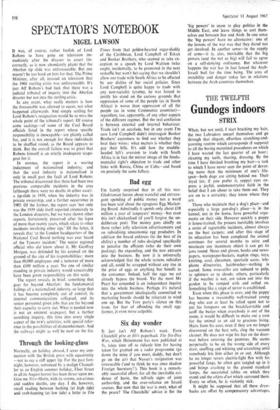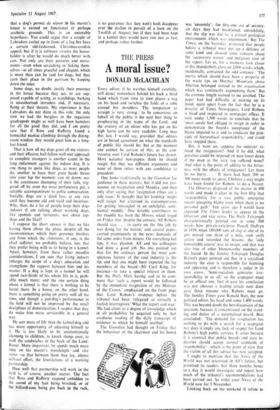Gundogs indoors
THE TWELFTH STRIX
When, but not until, I start brushing my hair, the two Labradors uncurl themselves and go through that elegant, effortless stretching-and- yawning routine which corresponds (I suppose) to all the boring matutinal procedures on which I have wasted the last quarter of an hour: cleaning my teeth, shaving, dressing. By the time I have finished brushing my hair—a task to which I have never seen the point of devot- ing more than the minimum of one's life- span—both dogs are sitting behind me. Their loyal (or, if you prefer it, soppy) eyes ex- press a joyful, undemonstrative faith in the belief that I am about to take them out. They are on to a certainty; they know where they are.
Those who maintain that a dog's place—and especially a large gun-dog's place—is in the kennel, not in the home, have powerful argu- ments on their side. However quickly a puppy is house-trained, the process inevitably involves a series of regrettable incidents, almost always on the best carpets; and after this stage of its education has been completed the animal continues for several months to seize and masticate any inanimate object it can get its jaws round. Shoes and gloves, books and news- papers, wastepaper-baskets, napkin rings, toys, knitting, coal, chessmen, spectacle cases, tele- phone directories, hairbrushes—nothing is sacred. Some trouvailles are reduced to pulp, to splinters or to shreds; others, particularly if the weather is wet, are taken out into the garden to be romped with and rolled on. Something like a reign of terror is established.
Even when this phase is over, and the puppy has become a reasonably well-trained young dog who can at least be relied upon not to put his forepaws on the breakfast-table and scoff the butter when everybody is out of the room, it would be difficult to make out a case for the animal as an aid to gracious living. Hairs from his coat, even if they are no longer discovered on the best sofa, clog the vacuum cleaner. He does not wipe his feet on the door- mat before entering the premises. He seems perpetually to be on the wrong side of every door, snuffling and whining and scratching until somebody lets him either in or out. Although he no longer severs electric-light flex with his powerful fangs, he often gets tangled up in it and brings crashing to the ground standard lamps, the occasional tables on which they stand and the objets d'art which surround them. Every so often, he is violently sick.
It might be supposed that all these draw- backs are offset by compensatory advantages,
that a dog's permis de sejour in his master's house is earned on functional or perhaps aesthetic grounds. This is an untenable hypothesis. You could argue that a couple of Labradors curled up in front of a log fire have a certain old-fashioned. Christmas-cardish appeal; but if it is. tableaux vivants the house- holder is after he would do much better with cats. Not only are their postures and move- ments—even when scratching or licking them- selves—at all times graceful and elegant, which is more than can-be said for dogs, but they earn their place in the garrison by keeping down the mice.
Some dogs, no doubt, justify their presence in the house because they act, or are sup- posed capable of acting, as watchdogs, barking at unauthorised intruders and, if necessary, flying at their throats. My experience is that Labradors do not shine in this role; the only time we had the burglars in the sagacious quadrupeds might as well have been hamsters for all the good they did, and I am pretty sure that if Ross and Rafferty found a homicidal maniac climbing through the dining- room window they would greet him as a long- lost friend.
That is how all my dogs greet all my visitors, and their effusive, hail-fellow-well-met approach to complete strangers is another count in the long indictment against the indoor dog. It is one thing to quite like dogs, as most people do, another to have their great heads thrust into your lap the moment you sit down; nor is the continuous thumping of their tails, trig- gered off by even the most perfunctory pat, a suitable accompaniment to polite conversation. Socially, dogs are a dead loss, at any rate until they become old and staid and incurious. Why, then, do a lot of people keep their dogs indoors (I am talking about working dogs, like spaniels and retrievers, not about lap- dogs and the like)?
I suppose the short answer is that we like having them about the place, despite all the inconveniences which their presence involves and from which the chatelaine, if any, is the chief sufferer; we probably believe, too, that they prefer being with us to being in a kennel. Apart, however, from these rather maudlin considerations, I am sure that living indoors enlarges the scope of a dog's education and strengthens the rapport between him and his master. If a dog is kept in a kennel he will spend two-thirds of his whole life in it, prob- ably much more; and the one certain thing about a kennel is that there is nothing to be learnt there. In a house, on the other hand. there is something going on pretty well all the time, and though a gun-dog's performance in the field will not be improved by the small disciplines of domestication, I suspect that they do make him more serviceable in a general way.
He sees more of life than the kennel-dog and has more opportunity of adjusting himself to it. He is less likely to be unintentionally alarming to children, to knock things over, to wolf the sandwiches in the back of the Land- Rover. More important, he spends much more time on his master's wavelength—and vice versa --so that between them they lay, almost without effort, the foundations of a working partnership.
How well that partnership will work in the field is, of course, another matter. The fact that Ross and Rafferty respond unbidden to the sound of my hair being brushed, or of the billiard-cues being put back in the rack, is no guarantee that they won't both disappear over the skyline in pursuit of a hare on the Twelfth of August; but if they had been kept in a kennel they would have run just as fast, and perhaps rather further.































 Previous page
Previous page